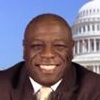01 Apr 2011 Why Al Sharpton is Afraid of Black Conservatives, by Kevin Martin
 As a black conservative, I’ve come to the conclusion that my progressive critics don’t dislike me as much as they fear people such as me.
As a black conservative, I’ve come to the conclusion that my progressive critics don’t dislike me as much as they fear people such as me.
Black progressives are particularly embittered of us because black conservatives can counter their lies, smears and all-around disinformation in claiming to represent the views of all blacks.
Nowhere has this been more evident lately than when black progressives seek to smear the tea party movement as racist.
Despite tea partiers coming together in opposition to out-of-control spending and a record deficit, the crushing regulatory control of the Obama Administration and Obama’s rubber-stamp on Capitol Hill for his first two years in office, the President’s ardent supporters quickly play the race card and rely upon their black colleagues to portray the tea party agenda based more on the color of Obama’s skin than his agenda.
Mychal Massie, the chairman of the Project 21 black leadership network and a frequent speaker at tea party events, challenged professional agitator Al Sharpton, National Urban League president Marc Morial and former D.C. congressional delegate Walter Fauntroy to a debate over racial allegations the men leveled against the tea party movement. Letters, faxes, calls and e-mails went unanswered.
Massie was forced to hold an “empty chair debate” at the National Press Club in Washington, D.C. on February 28 since they wouldn’t defend themselves in person.
Having been challenged by Massie, a black conservative, these progressives ran for the hills.
Yet Sharpton was later willing to debate nationally-syndicated talk radio show and Fox News Channel host Sean Hannity at his National Action Network Convention in New York City.
I like Sean Hannity, and I’ve been featured on his programs several times. I know he and Sharpton are friendly. But Sharpton’s willingness to debate Hannity over Massie clearly shows how black progressives fear their black conservative counterparts.
While it was reported that Hannity had Sharpton “on the defensive” at a similar debate at the 2007 NAN convention, it’s not the same. For one thing, it was on Sharpton’s turf — his group’s convention — and it’s not something he even really promoted. More importantly, however, Sharpton and his supporters can dismiss Hannity, no matter how persuasive he is, by saying he is not part of the community. After all, what can a white guy really know about black America?
I believe Massie would wipe the floor with Sharpton, and Sharpton knows it. That is likely why black progressives want no part of a public, civil debate against Massie or any other black conservative.
When black conservatives appear in the media, as I know from experience, the deck is often stacked against us. The host will invite one or more black progressives and allow them to dominate the debate. And that’s when we are invited at all. I have also noticed that, when members of the Congressional Black Caucus appear, it seems they are usually on without any opposition at all.
Black conservatives such as Herman Cain, Tim Johnson and Mychal Massie are rarely on CNN or MSNBC. It’s much easier to pretend we don’t exist because, unlike our progressive counterparts, we have found true success in America and don’t resort to using our skin color and victimization as a calling card.
Simply put, progressives likely fear that a side-by-side comparison will reveal their shallow rhetoric and could hurt their cause. So it’s best to deny the existence of black conservatives altogether.
Quite simply, black progressives bring no new ideas to the table. Their agenda, which embraces decades of big government nanny state politics, can’t stand up to the scrutiny of black conservatives. This is why Al Sharpton and others fear debating us.
# # #
Kevin L. Martin is a member of the national advisory council of the Project 21 black leadership network. Comments may be sent to [email protected].
Published by the National Center for Public Policy Research. Reprints permitted provided source is credited. New Visions Commentaries reflect the views of their author, and not necessarily those of Project 21, other Project 21 members, or the National Center for Public Policy Research, its board or staff.



